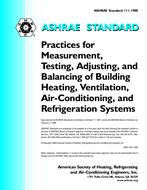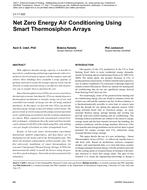Two high-performance prototype houses were built in Carbondale, Colorado, as part of the US Department of Energy’s Building America (BA) Program. Each prototype was a 1256 ft2 (117 m2), one-story, three-bedroom house and met the local requirements for affordable housing. The authors, representing the National Renewable Energy Laboratory, performed short-term field testing and DOE-2.2 simulations in support of this project at the end of December 2004. They also installed long-term monitoring equipment in one of the houses, and are currently tracking the performance of key building systems under occupied conditions. One of the houses (designated H1) included a package of cost-effective energy-efficiency features that placed it well above the Energy Star level, targeting a Home Energy Rating System (HERS) score of 88– 89. The other (designated H2) was a BA research house, targeting a HERS score of 94–95 and 45% whole-house energy savings compared to the BA Benchmark. The floor plans and other basic characteristics of the two houses were nearly identical except for the extended package of energy efficiency measures in the H2, including a 1.6 kW (5500 Btu/h) photovoltaic system, a combination solar hot water and radiant space heating system, heat recovery ventilation, and orientation specific glazing. Preliminary results from the field evaluation indicate that the energy savings for both houses will exceed the design targets established for the project, although the performance of certain building systems, including the ventilation and foundation systems, leave some room for improvement.
Citation: ASHRAE Trans. vol. 112, pt. 2, paper no. QC-06-028, p. 296-307
Product Details
- Published:
- 2006
- Number of Pages:
- 12
- File Size:
- 1 file , 550 KB
- Product Code(s):
- D-28749


